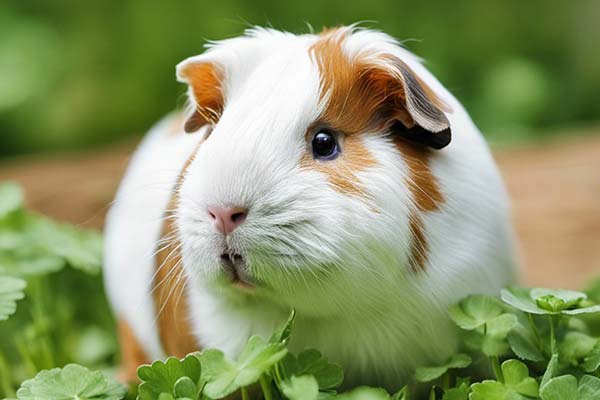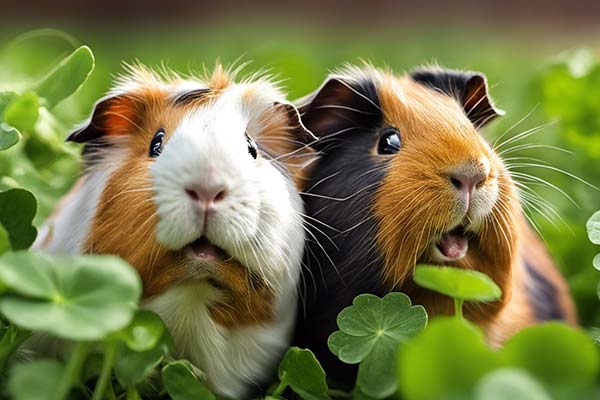Guinea pigs, beloved and sought-after companions, necessitate a well-rounded diet. Concerned caregivers frequently inquire about the suitability of foods, such as clover, for their cherished pets.
Yes, guinea pigs can eat clover, but it is essential to be mindful of the quantity and quality of the clover they consume.
Clover is a good source of fiber and other essential nutrients for guinea pigs, such as vitamin C. However, ensuring that the clover is fresh and free from any pesticides or harmful chemicals is crucial.
To maintain their well-being, it’s advisable to limit guinea pigs’ consumption of clover, offering only small portions.
Introduce new foods slowly, aiming for a balanced diet encompassing vegetables, hay, and variety. This helps prevent potential health problems.
Nutritional Benefits of Clover for Guinea Pigs
Clover is a popular plant that is often found in lawns and meadows. Guinea pigs can eat clover and benefit from its nutritional content.
Clover is rich in vitamins, minerals, and fiber, which makes it a healthy addition to a guinea pig’s diet.
Clover’s Nutritional Profile
Clover contains essential nutrients for a guinea pig’s health and well-being. It is a good source of vitamin C, which guinea pigs cannot synthesize on their own and must obtain through their diet. Clover also contains calcium, magnesium, and phosphorus, essential for bone and teeth development.
Health Benefits
- Enhancing Immunity: Clover’s antioxidants bolster the immune system and shield cells from free radical-induced harm.
- Promoting Digestive Health: The fiber in clover maintains digestive regularity and prevents constipation.
- Nurturing Bones and Teeth: Clover’s calcium and phosphorus are crucial for strong bone and teeth formation.
- Boosting Heart Health: Magnesium in clover supports cardiovascular well-being.
- Enhancing Vision: Clover’s vitamins A and C are vital for eye health.
Types of Clover
There are several types of clover, including red clover, white clover, sweet clover, hop clover, purple clover, and three-leaf clover. Each type has its unique nutritional benefits. Clover flowers are also edible and contain vitamins A and C.
Clover Hay and Sprouts
Clover hay is a popular food for guinea pigs and other small animals. It is rich in fiber and provides a good source of nutrition. Clover sprouts are also a healthy addition to a guinea pig’s diet and can be grown at home.
Potential Health Risks and Concerns
While clover can be a tasty treat for guinea pigs, owners should know about potential health risks and concerns.
Moderation: Clover is a Treat, not a Staple
It is important to remember that clover should only be given to guinea pigs in moderation, as it should be treated as a treat rather than a staple food. While clover is a good source of fiber and other nutrients, it should not make up a large part of their diet.
Impact of Too Much Clover: Bladder Stones
Overloading a guinea pig with clover can disrupt its diet by overshadowing crucial nutrients in various vegetables and hay. Additionally, excess clover might promote the development of painful and potentially fatal bladder stones.
Is Clover Safe for Guinea Pigs? Proper Precautions and Preparations
While clover is generally considered safe for guinea pigs, owners should take some precautions and preparations to ensure their pets’ safety.
First, ensuring the clover is free from harmful chemicals or contaminants, such as pesticides or toxic plants, is crucial.
Second, guinea pig owners should ensure that their pets are not overeating clover and have access to various vegetables and hay to ensure a balanced diet.
Other Potential Risks
Excessive clover consumption can lead to various health issues in guinea pigs. Apart from bladder stones, it can cause bloating, gas, diarrhea, and weight gain.
Clover contains oxalic acid, hindering calcium absorption and promoting kidney stone formation. Imbalanced phosphorus and low vitamin C in their diet can result in problems like scurvy and dental issues.
Serving Suggestions and Moderation
Offer clover to guinea pigs in moderation to provide essential nutrients like vitamin C. While it can be given as a treat, limiting the amount is important to prevent potential health problems.
Introduce new foods slowly and maintain a balanced diet with a mix of vegetables and hay.
Safe Intake of Clover
Thankfully, clover, in general, is not considered toxic to guinea pigs. However, it is recommended that they only have moderate access to small amounts of clover.
The entire lawn or browsing area must be ensured not to be sprayed with chemicals first. It is vital to observe what kind of clover they receive and ensure it is clean and safe for consumption.
Serving Sizes and Frequency
When offering clover to guinea pigs, it’s important to mind the portion and frequency. They can consume both the leaves and seed heads of clover. However, clover lacks essential forage elements for healthy growth, so it shouldn’t dominate their diet.
While clover flowers provide vegetable protein, they should be regarded similarly to other veggies – a suitable occasional treat rather than a primary dietary component.
Monitoring Guinea Pig’s Response
Monitoring a guinea pig’s response when introducing new foods to its diet is essential. Some guinea pigs may have a sensitive digestive system and react differently to certain foods.
If a guinea pig shows signs of discomfort or digestive issues after consuming clover, it is best to avoid serving it to them in the future.
In addition to clover, guinea pigs can enjoy a variety of other safe vegetables, fruits, and treats. Bell peppers, cucumbers, fresh vegetables, berries, cilantro, parsley, spinach, plantain, and tomatoes are safe for guinea pigs.
Guinea pig pellets can be a great source of nutrition as long as they are all-natural and hay-based. Ideally, a guinea pig’s food list should be 80% hay and 20% healthy pellets and veggies, with the occasional snack.
How to Introduce Clover into Your Guinea Pig’s Diet
When introducing new food to your guinea pig’s diet, it is essential to do so gradually to avoid gastrointestinal distress. Here are some tips on how to introduce clover to your guinea pig’s diet:
Slow Introduction to New Foods
Guinea pigs possess delicate digestive systems, so introducing novel foods rapidly can lead to digestive disturbances. To mitigate this, it’s advisable to gradually introduce new foods by beginning with small portions and progressively increasing them.
Gradual Increase of Clover in the Diet
Clover is a high-fiber food that can benefit your guinea pig’s health. However, it is important to introduce it slowly to avoid any digestive issues. Start by offering a small amount of clover and gradually increase the amount over several days.
Monitoring for Allergic Reactions
Although clover is usually considered safe for guinea pigs, certain individuals might exhibit allergies. Vigilance is crucial to detect allergic reactions like itching, sneezing, or breathing issues. If these signs appear, discontinue clover consumption and seek guidance from a vet.
Behavior
Observing their behavior is crucial when adding new food to your guinea pig’s diet. If they decline the clover or display any discomfort after consuming it, exclude it from their diet and seek advice from a veterinarian.

Specific Types of Clover for Guinea Pigs
Guinea pigs can eat different types of clover, but knowing which ones are safe and appropriate for them is essential. Here are some specific types of clover that guinea pigs can eat:
White Clover
White clover, a prevalent clover variant, is a safe dietary option for guinea pigs. Rich in fiber and essential nutrients, it can be consumed reasonably. Confirming that the white clover is free from chemical treatments or pesticides is crucial.
Red Clover
Red clover is another type of clover that guinea pigs can eat. It contains some oxalic acid, which can be harmful in excessive amounts. Therefore, it is recommended to feed red clover to baby guinea pigs and limit the amount given to adult guinea pigs.
Purple Clover
Purple clover is safe for guinea pigs to eat in moderation. It is a good source of fiber and nutrients, and guinea pigs can enjoy it as a treat. However, like with other types of clover, it is crucial to ensure that it has not been treated with harmful chemicals.
Sweet Clover
Sweet clover is generally safe for guinea pigs, yet moderation is key. While it’s okay in small quantities, excessive consumption can be problematic due to its coumarin content. To ensure the well-being of guinea pigs, it’s advised to restrict their intake of sweet clover.
Other Types of Clover
In addition to regular clover, guinea pigs can consume various other clover varieties, including hop clover, three-leaf clover, and yellow clover. Still, it’s crucial to confirm that these alternatives are free from harmful chemicals, as with standard clover.
Clover Grass and Flowers
Guinea pigs can also eat clover grass and flowers, which are safe and healthy. Clover hay is also a good source of fiber for guinea pigs. However, ensuring the clover has not been treated with harmful chemicals is crucial.
Alternative Safe Plants and Vegetables
Diversifying guinea pigs’ diets is crucial to provide them with essential nutrients for their well-being. Alongside clover, guinea pigs can safely eat numerous other vegetables and plants.
Dandelion leaves and flowers are a popular choice of wild plants for guinea pigs. They can be found in grassy areas like lawns, fields, woods, meadows, and hedgerows. Dandelions bloom between March and October but mainly in May and June, and a guinea pig can eat the dandelion plant’s flowers and leaves.
Grass is also safe for guinea pigs if not treated with chemicals. Guinea pigs enjoy grazing on fresh grass, providing them with a good source of fiber.
Due to their vitamin A content, Guinea pigs can enjoy carrots as a sweet treat. Kale, rich in vitamin C and other nutrients, is another suitable veggie in moderation.
Cilantro, an herb with anti-inflammatory properties, is safe and high in vitamin C. While tomatoes offer vitamin C, their leaves and stems are toxic.
Leafy greens like spinach and collards are beneficial for their vitamins, minerals, and fiber. Plantain, a lawn weed, aids digestion due to its fiber content and is safe for guinea pigs.
Frequently Asked Questions
Can Baby and Pregnant Guinea Pigs Eat Clover?
Baby guinea pigs and pregnant guinea pigs can eat clover, but it is vital to introduce new foods slowly and in moderation. Pregnant guinea pigs have different nutritional needs, so it is best to consult a veterinarian before introducing new foods.
Can Guinea Pigs Eat Clover Sprouts, Hay, or Grass?
Guinea pigs can eat clover sprouts, hay, and grass. However, ensuring that the clover has not been treated with pesticides or other harmful chemicals is crucial.
How Much Clover Should Guinea Pigs Have and How Often?
Clover should be given to guinea pigs in moderation, as it is high in calcium and oxalates. A small handful of clover per week is sufficient for most guinea pigs. Monitoring the guinea pig’s behavior and digestive health is crucial when introducing new food into their diet.
Do Guinea Pigs Like Eating Clover?
Many guinea pigs enjoy eating clover, but every guinea pig is different. Some may prefer other types of vegetables or hay. It is vital to offer a variety of foods to keep the guinea pig’s diet balanced.
What Happens If a Guinea Pig Overeats Clover?
Overindulging in clover can lead to digestive issues like bloating or diarrhea in guinea pigs. More severe instances might even result in health problems like bladder stones or kidney damage. Hence, closely monitoring their clover and other high-calcium foods intake is paramount.

